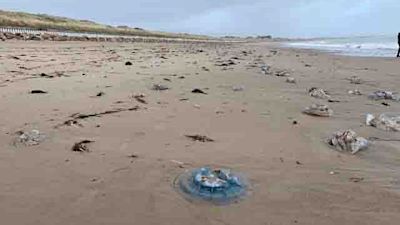Hundreds of giant barrel jellyfish wash up on Gwynedd beach after stormy weather

Hundreds of giant barrel jellyfish have washed up on a Gwynedd beach after stormy weather hit over the weekend.Glan Don beach in Pwllheli was awash with tons of the giant barrel jellyfish, with walkers left 'stunned' by the number of jellyfish along the shore.The beach, which runs from Pwllheli harbour to Abererch, was covered in a swarm of the huge sea creatures, with some of them as high up on the beach as the dunes.One person, who was on the beach walking her dog, said: "I can't believe how many there are. I've never seen so many in one place. They're massive - it's like an invasion!"
Marine conservationist Frankie Hobro, who runs Anglesey Sea Zoo, says that it is not uncommon for a large number of jellyfish to end up on land after bad weather.She said: "These are Barrel jellyfish, one of our largest species here. They can reach up to one metre in diameter."They are robust and solid, mostly white but with some purple fringing to the edge of the body."They lack the long tentacles of many species but have thick, frilled arms hanging down instead and they are in fact not harmful to humans."However, I never recommend touching any jellyfish, even if they appear dead on the beach, as jellyfish species can be easily misidentified."You often find a mixture of different jellyfish species in the same swarm and the tentacles can still sting for some time after the animal gets washed up."
Frankie Hobro continued: "Jellyfish are present in the North Atlantic for most of the year but a large number washed up together like this will be due to the stormy weather over the weekend."It's common to see jellyfish in large numbers like this - much more common than seeing the odd one - because they tend to live and feed in the same conditions and get carried by the same currents from the early stage of their lifecycle."Jellyfish cannot swim. They drift passively and get carried by oceanic currents and these will have been present further south in the Atlantic in warmer waters then carried here when the stormy weather mixed the warmer waters with the Gulf Stream."Here in the UK we usually start to see them in the largest numbers in early summer when the sea temperatures offshore become sufficiently warm for them to live and feed here."Jellyfish are 95 per cent water and have no brain, heart, bones, eyes or blood.Due to being made up almost entirely of water, once they wash up on the beach it isn't too long before they disappear as the water evaporates.